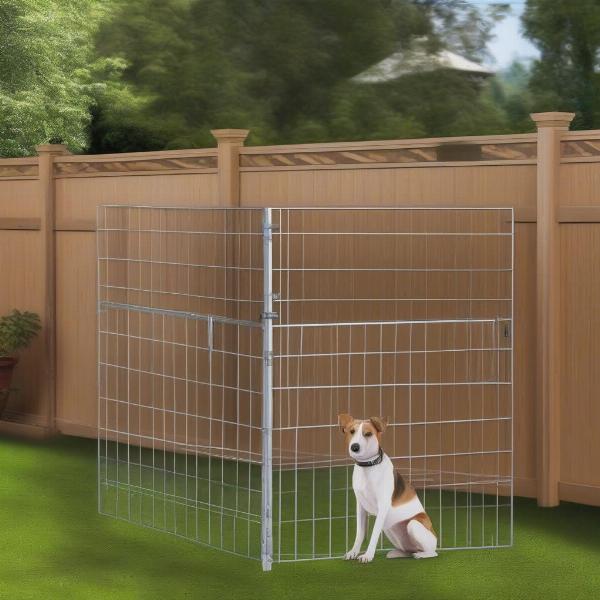Choosing the right fence panels for your dog is a crucial aspect of responsible pet ownership. Whether you’re creating a safe haven in your backyard or setting up a dedicated kennel, understanding the various types of fence panels, their benefits, and how to choose the best one for your furry friend is essential. This guide will walk you through everything you need to know about dog fence panels, from material considerations to installation tips.
Choosing the Right Fence Panel Material
The material of your fence panels significantly impacts durability, maintenance, and overall aesthetics. Here’s a breakdown of common materials:
- Wood: A classic choice, wood offers a natural look and is relatively easy to install. However, it requires regular maintenance like staining and sealing to prevent rot and weathering.
- Metal: Metal panels, such as chain link or welded wire, are durable and provide excellent visibility. Chain link is affordable but can be climbed by determined dogs. Welded wire is more secure but less visually appealing.
- Vinyl: Vinyl fencing is low-maintenance and weather-resistant, making it a popular choice. It comes in various styles and colors, offering aesthetic flexibility. However, it can be more expensive than other options.
Factors to Consider When Selecting Fence Panels
 Dog Fence Panel Height and Spacing
Dog Fence Panel Height and Spacing
Beyond the material, several other factors play a role in choosing the right fence panels:
- Height: The fence height must be appropriate for your dog’s size and jumping ability. Larger and more athletic breeds require taller fences to prevent escapes.
- Spacing: For smaller dogs, ensure the spacing between panels or wires is narrow enough to prevent them from squeezing through.
- Digging Prevention: If your dog is a digger, consider burying chicken wire or installing an L-footer along the fence base to deter escapes.
- Gate Security: A sturdy and secure gate is essential. Look for latches that are difficult for dogs to open.
Installation and Maintenance of Dog Fence Panels
Proper installation is crucial for the effectiveness and longevity of your fence. Follow manufacturer instructions carefully and consider professional installation if needed. Regular maintenance, such as cleaning and checking for damage, will help keep your fence in optimal condition.
What is the Ideal Height for a Dog Fence?
The ideal height for a dog fence depends on the breed and size of your dog. For smaller breeds, a 4-foot fence may suffice. However, larger and more athletic dogs may require a 6-foot or even 8-foot fence to prevent them from jumping over.
How Can I Prevent My Dog From Digging Under the Fence?
Several methods can deter digging, including burying chicken wire along the fence line, installing an L-footer, or placing large rocks or concrete pavers at the base of the fence. dog fence panels can offer further solutions for this.
Are Chain Link Fences Suitable for Dogs?
Chain link fences can be suitable for dogs, particularly if they are properly installed and tall enough. However, they offer less privacy and can be climbed by agile dogs. You might want to consider 4×8 dog ear fence panels for added security.
Conclusion
Selecting the right fence panels for your dog involves careful consideration of various factors, from material and height to installation and maintenance. By understanding your dog’s needs and researching the available options, you can create a secure and comfortable environment for your furry companion. Remember, a well-chosen fence not only protects your dog but also provides peace of mind for you. Consider dog kennel fence panels if you’re setting up a kennel area.
FAQ
- What’s the most durable material for dog fence panels? Metal, particularly welded wire, is generally the most durable option.
- How deep should I bury the fence posts? Post depth depends on the fence height and soil type but generally ranges from 2 to 3 feet.
- Can I install dog fence panels myself? Yes, with proper planning and tools, many homeowners can install fence panels themselves. chain link fence panels for dog kennels are typically DIY-friendly.
- How do I stop my dog from chewing on the fence? Apply a dog-safe deterrent spray or provide chew toys to redirect their attention.
- What’s the best type of fence for a small dog? A shorter fence made of wood, vinyl, or even a sturdy wire mesh can be suitable for small dogs, considering welded wire fence for dogs.
ILM Dog is your trusted international resource for all things dog-related. We offer expert advice on dog breeds, health, training, nutrition, grooming, and much more. Whether you’re a seasoned dog owner or just starting your journey, ILM Dog is here to support you. Contact us at [email protected] or +44 20-3965-8624 for personalized guidance.